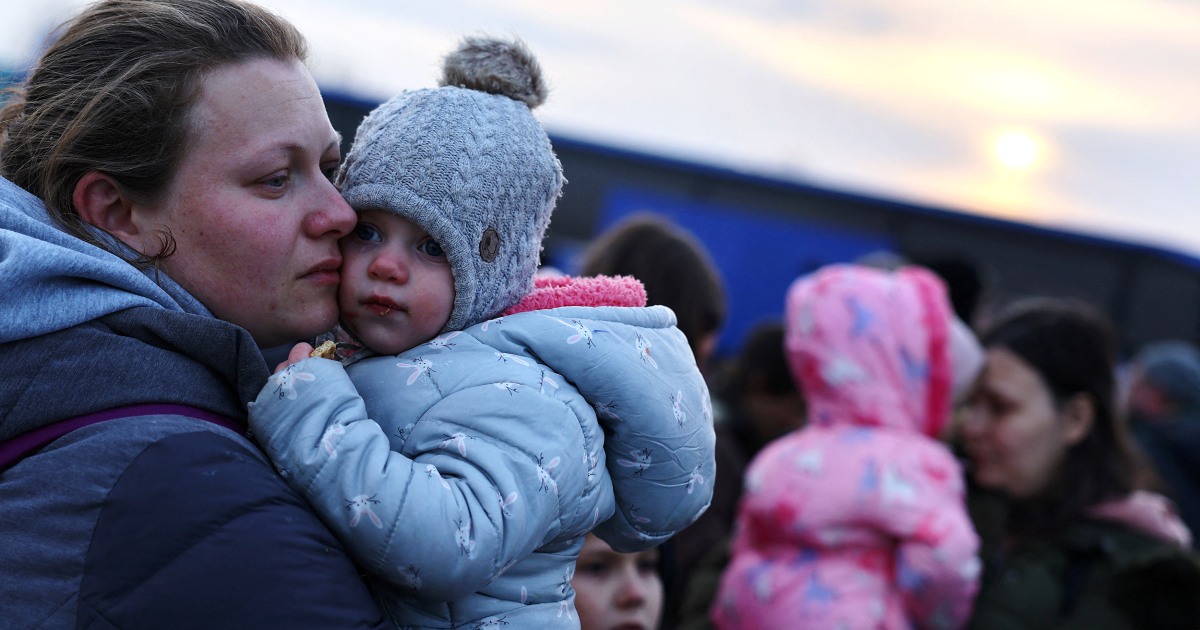
Russia’s invasion of Ukraine stunned the world as full-scale war broke out. The atrocities in Ukraine have garnered widespread coverage across the globe. But this reporting has unsheathed the flagrant racist and biased attitudes toward the value (or the lack thereof) of non-European life.
“This isn’t a place, with all due respect, like Iraq or Afghanistan, that has seen conflict raging for decades,” Charlie D’Agata, a senior CBS News correspondent, reported from Kyiv. “You know, this is a relatively civilized, relatively European — I have to choose those words carefully, too — city where you wouldn’t expect that or hope that it’s going to happen.”
The Western world values white lives over those dying in conflicts outside Europe.
His comments resulted in swift online backlash, forcing the seasoned correspondent to apologize. His remarks are not part of an isolated incident, but have underlined a worrying fact: the Western world values white lives over those dying in conflicts outside Europe.
The brazen attitude toward the hundreds of thousands of lives lost in Iraq and Afghanistan is deplorable and legitimizes conflict in the Middle East. Let’s not forget that Iraq is literally referred to as the “cradle of civilization,” and Baghdad was once the world’s science capital. I agree that Kyiv is a city I wouldn’t “hope” for violence in, but neither would I “hope” for it in Baghdad, Kabul or any other city. The double standards are ludicrous.
“Now the unthinkable has happened to them, and this is not a developing, third world nation; this is Europe,” a visibly emotional Lucy Watson proclaimed for ITV News in Kyiv, as if 11 years ago Syrians had been expecting to wake up to a devastating war. Anyone would fear cruise missiles, but for one French commentator on BFM TV, it is only conceivable to have attacks elsewhere. “We are in a European city and we have cruise missile fire as though we were in Iraq or Afghanistan, can you imagine,” he said.
Writing for The Telegraph, the British pundit Daniel Hannan penned, “They seem so like us. That is what makes it so shocking. Ukraine is a European country. Its people watch Netflix and have Instagram accounts…War is no longer something visited upon impoverished and remote populations.” Hannan or Lord Hannan of Kingsclere, to afford him his full-privileged title, who doesn’t use Instagram (at least publicly), may be surprised to find out that outside of the Western world, many people do use the platform. If he’d care to find out, he’d surely know that in Iraq, for example, nearly 30 million of its 40 million population use social media — including more than 15 million Instagram users. Also, Netflix is available in the Middle East, where many are hooked on to the streaming service.
The problem isn’t that non-Europeans aren’t like us. It is that the years of continued dehumanization have made their deaths tolerable — just a statistic confined to the midsection of newspapers.
Journalists report from Ukraine in shock as if bloodshed is exclusive to Black and brown communities.
Even in the entertainment world, the tendency to take war in the Middle East lightly compared to Ukraine has been very evident. For example, last weekend “Saturday Night Live” on NBC opened with a somber tone as the Ukrainian Chorus Dumka of New York performed a prayer for Ukraine. When compared with the 2001 war party skit performed in the wake of the Afghanistan invasion, it becomes clear that solidarity can be discriminatory. In the sadistic clip, Will Ferrell, Jimmy Fallon, Maya Rudolph and others prance as they sing, “no more bearded dudes.” Twenty years on, the conflict is still no joke for the people of Afghanistan.
And had Hollywood, instead of focusing on content that represents the Middle East as an “impoverished” war-torn region, funded more positive representation, perhaps more people wouldn’t assume war is endemic to the region, and maybe consider the loss of life there just as heartbreaking as in Ukraine.
If anything, the wave of solidarity with Ukraine across the world has been inspiring. But it has been impossible, as a person of color with parents from Iraq, to not see this as selective solidarity. One Ukrainian official on BBC News, unchecked by the reporter, made it clear, “It’s very emotional for me because I see European people with blonde hair, blue eyes being killed, children being killed every day with Putin’s missiles.” These same missiles from Russian President Vladimir Putin also landed in Syria and Chechnya, but reactions were subdued.
The effects of such sentiments have spilled into policy with countries across Europe opening doors for Ukrainian refugees that were closed for others. The right-wing nationalist Hungarian Prime Minister Viktor Orban referred to Middle Eastern migrants as “invaders” last year, but when it comes to Ukrainian refugees, he’s said, “We’re letting everyone in.” Bulgarian Prime Minister Kiril Petkov expressed the double standard even clearer. “These are not the refugees we are used to… these people are Europeans,” he said. “These people are intelligent, they are educated people … This is not the refugee wave we have been used to, people we were not sure about their identity, people with unclear pasts, who could have been even terrorists.”
Reflecting the bigotry in the international media, African citizens living in Ukraine trying to flee the conflict have experienced racism at the borders, barred from crossing, unlike their white Ukrainian counterparts.
With Ukraine’s whiteness, it has been difficult for Europeans to fathom a time when the region was ravaged by war and civilians were fleeing for their safety. Journalists report from Ukraine in shock as if bloodshed is exclusive to Black and brown communities. In reality, many Europeans have lived through the Yugoslav wars of the ’90s. Their parents and grandparents can also remind them of the atrocities of World War II — but it is the Middle East that is deemed to be “uncivilized” and “impoverished.” During the horrors of the World War II, it was this “uncivilized” Middle East that welcomed refugees without questions on education or affiliation with the Nazis.
The phenomenon to continually trivialize war in the Middle East and dehumanize the entire population is not new. Whenever violence erupts in the United States, pundits are quick to put out the message that “this is America, not the Middle East.”
In the aftermath of the violent Jan. 6 attack last year on the U.S. Capitol, CNN anchor Wolf Blitzer made similar remarks. He tweeted a photo of National Guard troops and wrote, “So many streets have been closed. It reminds me of the war zones I saw in Baghdad or Mosul or Falluja. So sad.” In the wake of the Black Lives Matter protests, a former New York City Police Department commissioner compared scenes to those in the Middle East. “This is not Baghdad, this is not Mosul Iraq, this is not Falluja and it’s not Afghanistan! It’s Minneapolis, Minnesota…,” he tweeted.
Heartfelt solidarity with Ukraine has shown hope for supporting a community in need, and journalism is vital for enlightening us on the atrocities happening in that country. Such reporting, however, should not be at the expense of others. Contributing to the problem is the fact that journalism is plagued with representation issues around the world. In the U.S., 40 percent of the population is nonwhite, but a 2020 Reuters Institute study examining 10 top online news outlets and 10 top offline news outlets found that only 11 percent of top editors are nonwhite.
With better representation in the media, maybe the errors by D’Agata and others would have been avoided. Bearing in mind that he chose his words “carefully,” I shudder to think what journalists would spew when unhinged. We need to do better and combat this racism. No life is worth more than another.
Source: | This article originally belongs to Nbcnews.com









